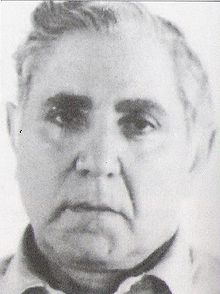Phillip “Rusty” Rastelli was a former boss of the Bonanno crime family, taking over the rein in the early 1970s, following the retirement of Joseph Bonanno. Rastelli, who listed his occupation as a radio dispatcher for a taxi company, was eventually convicted of antitrust violations and sentenced to a 10-year prison term. He reportedly directed the operations of the family from prison, however; he could not be influential from behind bars and his control waned.
Rastelli was born January 31, 1918 in Maspeth, Queens. He had five siblings; Carmine, Marinello, Agustus, Justina and Grace.
Rastelli was heavily involved in loansharking, extortion and drug trafficking activities before joining the Bonanno crime family. He was said to be close friends with Dominick “Sonny Black” Napolitano, Carmine Galante, Joseph Bonanno and Joseph Massino.
On December 3, 1953, Rastelli and an associate allegedly shot William Russo in Queens. However, Russo survived the shooting, and Rastelli, fearing identification, went into hiding. Over the next year, Rastelli’s wife Connie allegedly approached Russo’s wife many times with an offer of $5,000 if her husband did not identify Rastelli. The bribe was said to be refused each time. On December 13, 1954, Connie Rastelli was indicted on charges of attempting to bribe a witness. Around the same time, Russo was killed in Brooklyn. No one has been charged with his murder.
Connie Rastelli was believed to have been killed in 1962 after she became a Federal informer, according to a New York Times obituary for Phillip Rastelli. Mrs. Rastelli, who had been angered over her husband’s suspected infidelities, began telling Federal investigators about the family’s criminal activities. Her body reportedly has never been found.
In 1969, in an attempt to restore order to the Bonanno family, the Commission appointed a three-man panel to run the family comprised of Rastelli, Joseph DiFilippi, and Natale “Joe Diamonds” Evola.
On July 21, 1971, Rastelli was indicted in Riverhead, New York on loansharking charges. The loansharking ring, centered in Babylon, New York and Islip, New York, charged victims from 250 to 300 percent interest annually and reportedly generated over $1 million per year in revenue for the Bonanno family. On December 28, 1972, Rastelli was convicted in state court on seven counts of loansharking.
On August 28, 1973, Evola died and Rastelli became acting boss of the Bonanno family. On February 23, 1974, at a meeting at the Americana Hotel (now the Sheraton New York) located in Manhattan, the Commission named Rastelli as official boss, but the real power in the family soon migrated to rival and underboss Carmine Galante.
On March 6, 1975, Rastelli was indicted on racketeering charges for extortion and anti-trust violations. He was convicted of the anti-trust and extortion on August 27, 1976 and given one year on the anti-trust violation and three concurrent ten-year sentences on the extortion.
Sent to federal prison in Lewisburg, Pennsylvania, Rastelli was sent to federal prison in Lewisburg, Pennsylvania. In 1979, the imprisoned Rastelli allegedly ordered Galante’s murder. The other Commission members had decided that Galante was bad for their business and gave Rastelli permission to remove him. Rastelli would become the undisputed boss, controlling from behind bars through the use of acting bosses such as longtime Bonanno mobster Salvatore “Sally Fruits” Ferrugia.
There was disagreement within the Bonanno crime family as to whether Rastelli should be the boss, which led to an internal war in 1981. This resulted in the murders of several people including opposition leader Bonanno caporegime Alphonse “Sonny Red” Indelicato, who had opposed Rastelli remaining the boss. This power struggle was reported to be witnessed by FBI agent Joseph “Donnie Brasco” Pistone, who was working undercover.
Rastelli was paroled from prison in late 1983, as it was said that he attempted to restore order, unity and respect to his crime family which had been greatly damaged and diminished from underworld power and influence.
Over the years, there has been a belief that the American mafia was not directly involved in the drug trade as some bosses ordered their men not to get involved with drugs, but many disobeyed. For the Bonanno family, the drug trade became one of its most lucrative rackets.
In 1985, Rastelli was indicted, along with other Cosa Nostra leaders, in the famous Mafia Commission Trial. The Bonanno family was spared from getting caught up in the Commission Trial, which sentenced many Mafia bosses and members to prison. However, when Rastelli was indicted on separate labor racketeering charges, prosecutors decided to remove him from the Commission trial. Having previously lost their seat on the Commission, the Bonanno family suffered less exposure than the others in the case.
On June 4, 1991, Rastelli was released from the Federal Medical Center in Springfield, Missouri, where he had undergone surgery, on humanitarian grounds. His release was ordered by Judge Charles P. Sifton of Federal District Court, the judge who had sentenced him, because he was believed to be dying.
On July 24, 1991, Rastelli died at Booth Memorial Hospital in Queens from liver cancer at age 73. His survivors included three brothers, Carmine, of Queens, who was convicted with his brother in the conspiracy case and who was also ordered to federal prison; Marinello, of Queens and Augustus, of Florida, and two sisters, Justina Devita and Grace Iacomini, both of Queens. He is buried in Saint John Cemetery in Middle Village, Queens.
